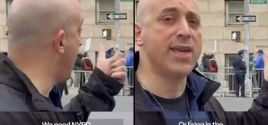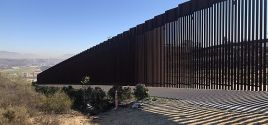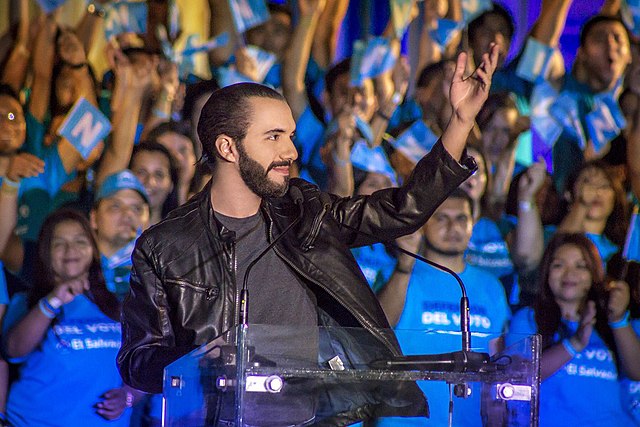El Salvador President Bukele's Wildly Popular Gang Crackdown is Reducing Illegal Immigration to U.S.Chris MenahanInformationLiberation Jul. 11, 2023 |
Popular 
'Sniper Seen on Roof Overlooking Pro-Palestine Protest' at Indiana University

ADL Urged Congress to Pass FISA Law Spying on Americans to 'Protect Israel'

Mike Johnson Pushes Debunked Lie That Israeli Babies Were 'Cooked in Ovens' On October 7

Axios Poll: Majority of Americans Now Want Mass Deportations

Claim Jewish Student Was 'Stabbed In The Eye' by Pro-Palestine Protester Draws Mockery After Video Released
  President Nayib Bukele's successful crackdown on MS-13 gang members has led to a dramatic reduction in the number of Salvadorans illegally crossing our southern border, the Wall Street Journal reports. President Nayib Bukele's successful crackdown on MS-13 gang members has led to a dramatic reduction in the number of Salvadorans illegally crossing our southern border, the Wall Street Journal reports.From The Wall Street Journal, "The Country With the Highest Murder Rate Now Has the Highest Incarceration Rate": El Salvador, long whipsawed by gang violence that made it one of the world's most dangerous countries, turned things around by jailing huge swaths of its population. The country once known for having the world's highest murder rate now has the world's highest incarceration rate—about double that of the U.S.These numbers are even more significant considering illegal immigration overall has hit record levels thanks to the Biden regime's open borders policies. It also has put some 68,000 people in this Massachusetts-size country of 6.3 million behind bars. That's more than 1% of the population, according to World Prison Brief, an online database on correctional systems. Rights groups said the campaign has swept up innocent people, especially among the country's poor and indigenous communities, who are held for long periods in harsh conditions without trial.It was reported in 2010 that around one fifth the entire population of El Salvador was living in the US. MS-13 gang members make headlines every week for committing heinous murders in cities throughout the US. We're supposed to believe these gang members have a "spark of divinity" inside them and the diversity they bring is "our greatest strength." The success of Bukele's heavy-handed crackdown has made fools of our ruling elites who insist "restorative justice" and throwing open our nation's prisons is how you create peace.
According to the WSJ, other Latin American countries "grappl[ing] with their own high murder rates" are considering following in Bukele's footsteps: Ecuadoreans, one of the largest nationalities heading to the U.S., have seen the homicide rate in their country quadruple from 2019 through 2022. Some politicians, such as Cynthia Viteria, who until May served as mayor of the violent Ecuadorean city of Guayaquil, encouraged Ecuador's government to mimic the Salvadoran leader's policies to bring down crime and stop the killing of police officers.The scale of MS-13's extortion was tremendous: Former central bank governor Carlos Acevedo said that gangs raked in an estimated $500 million a year from extortion paid by businesses and residents. Multilateral organizations estimated that crime cost El Salvador 15% of its $29 billion economy.The Biden regime has had nothing but criticism for Bukele for undermining what they call "democracy."
The Biden regime can have their opposition arrested and censored on social media but Bukele can't throw a bunch of gang members in prison. Incidentally, as the National Interest highlighted in May, they have no similar criticisms when it comes to the Dominican Republic's human rights abuses. From The National Interest, "Behind the Biden Administration’s Hypocritical Treatment of El Salvador And The Dominican Republic": Since Salvadoran president Nayib Bukele began his crackdown on violent street gangs, the Biden administration, international media, and NGOs have made the small Central American republic the focal point of negative attention about accused corruption, civil liberties violations, and creeping authoritarianism. In contrast, the Dominican Republic, which is using much harsher forms of "preventative detention," has seen virtually no hand-wringing about "democratic backsliding," corruption, and human rights violations. Instead, the Biden administration has praised the Dominican Republic's criminal justice system. The media and U.S. government's disparate treatment of these two Latin American nations demonstrates a lack of consistency and principles in our diplomacy towards our neighboring countries.The Biden regime must have been taking notes. [...] Yet these reports are ignored and contradicted by the White House and State Department leadership. Instead of criticizing the pretrial detention of political opponents under the guise of anti-corruption, President Joe Biden recently praised Abinader for "moderniz[ing] its anti-corruption law." In contrast, there has been little evidence that El Salvador's gang crackdown has been used on political opponents. Under Secretary of State for Security, Democracy, and Human Rights Urza Zeya has called the Dominican Republic a "bright spot" for "combating corruption, improving citizen security" and "protecting human rights."Bukele is a model leader for the world. We could only be so lucky as to live under his "dictatorship" rather than our own. Follow InformationLiberation on Twitter, Facebook, Gab, Minds and Telegram. |



